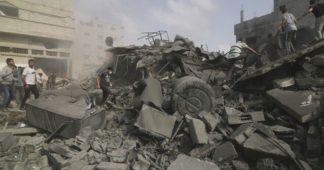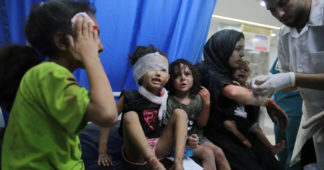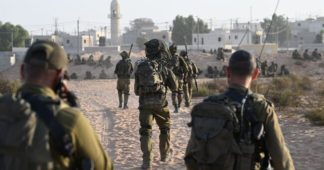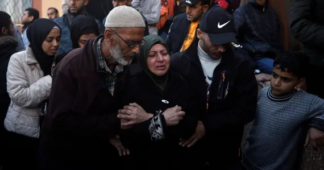Palestinians across Gaza anxiously await news of missing relatives, even as the bombardment continues
By Maha Hussaini
Jul 21, 2024
After the Israeli army withdrew from his sister’s home in Jabalia, northern Gaza, Ahmed Tawfiq Jaballah expected he would find her body.
However, when he returned to search the house, 55-year-old Sawsan was nowhere to be found.
Sawsan is among the thousands of Palestinians who have gone missing in Gaza since the onset of Israel’s war on the enclave, leaving families in the dark about their loved ones’ fates amid the ongoing ground invasion and bombardment.
“After my house was destroyed in this war, I came to live with my sister in her home along with my wife and children. Over the course of around 230 days, she had not left her home, not even once,” Jaballah told Middle East Eye.
“She couldn’t walk properly, and she preferred to die than evacuate her home or be displaced.”
On 11 May, the Israeli army dropped leaflets ordering residents in the Jabalia refugee camp to evacuate their homes before launching a violent attack and invading the area.
Although Jaballah and his family complied with the orders, Sawsan refused to leave her home.
“I kissed her hands and feet, pleading with her to agree to come with us to take shelter in a school. I called my friends and brought a wheelchair to try to convince her,” he explained.
“She told me: ‘There is no way [I can leave.] You know I treat you like my son, not just my brother. Just bring me a face mask to keep beside me for when there is dust, then take your wife and children and go.’”
“I left. But the next day, the Israeli army approached her home. When I heard this, I took the risk and went back to her using side streets, trying once more to convince her to come with me. She told me: ‘If you really love me, leave me in my home’. I saw an Israeli tank approaching the house, so I fled and returned to the school.”
Jaballah stayed in touch with his sister to ensure she was still okay through calls and text messages. However, after the early hours of 15 May, he could no longer reach her.
At around 2am, she texted him to inform him that she had some money tucked away in her clothes.
“She told me to take it if something happened to her and to send $100 to a 20-year-old orphan girl she had been sponsoring since her birth,” he continued.
“After many attempts to contact her without a response, I decided to go look for her. When I arrived in the area, the entire square had been devastated, except for her home and her neighbour’s home. I feared the worst and took a blanket I found nearby, preparing to cover her body for burial.
“I was terrified of what I might find. I expected to see a body in decay and blood everywhere. I entered the house, but there was nothing, not even my sister.”
Jaballah found his sister’s home empty, with Hebrew words sprayed on the walls and remnants of food and fruits scattered throughout.
These items are typically inaccessible to residents of northern Gaza due to the Israeli blockade.
“Her medical sandals, mobile phone, eyeglasses, even her crutch were all gone,” he continued.
“The army had been there. I found fruit inside the house. It was clear they had spent some time there.”
For months, Israel has enforced a strict siege on Gaza City and the northern Gaza Strip, blocking aid, goods and all types of food from entering the area, which is entirely cut off from the southern parts of the enclave.
As a result, residents can often identify houses where the Israeli army has stayed by the remnants of food that are otherwise unavailable in the city.
“I searched all the hospitals and places where we thought she might be. We contacted the Red Cross, and they responded from Hebron. They told me they had filed a request with the Israeli army regarding her on 4 June but had not received a response.”
After about two months, Jaballah suspects that his sister was taken by the Israeli army “for unknown purposes”.
“She couldn’t have fled on her own. She was taken by the army,” he continued.
“Everyone in Gaza has experienced displacement and knows that when we need to evacuate quickly due to bombardment. We usually do not have time to gather belongings. But she had time to take things that we wouldn’t normally think of when evacuating. They have taken her, but I don’t know what they intend to do with her.”
Missing children
Among the missing are civilians believed to be detained and forcibly disappeared in Israeli detention centres, including journalists and children.
By the end of June, the International Committee of the Red Cross (ICRC) had received reports from 7,429 families of 8,617 Palestinians missing across the Gaza Strip, seeking assistance to determine the fate and whereabouts of their loved ones.
Due to the overwhelming number of casualties amid relentless bombardment, many child survivors rescued from the rubble and admitted to hospitals remain unidentified for extended periods, often leading them to go missing.
In the al-Zawaida area of the Gaza Strip, Abdullah Abu al-Qumsan clings to hope that his two-year-old child, Fouad, who has been missing for about nine months, is still alive.
Displaced from the Jabalia refugee camp in northern Gaza, Abu al-Qumsan continues to hang his child’s picture on the streets, urging anyone who finds him to contact the number provided.
“The last time Fouad was with me was when we were both under the rubble on 31 October. We were displaced in a relative’s home in Jabalia and the entire residential square was bombed. My child was with me, just on my right,” Abu al-Qumsan told MEE.
“When the rescue crews realised we were still alive under the rubble around 75 minutes later, they managed to pull us. They pulled my child and handed him to a paramedic, who immediately took him to the hospital. But until now, we don’t know to which hospital he was transferred.”
Abu al-Qumsan was transferred to the Indonesian hospital in northern Gaza.
Over the next 10 days, he visited all the hospitals still operating in the northern areas, searching for his son among the injured and in the morgues.
“At al-Shifa hospital, they informed me that on the day of the bombing, they received an unidentified child around my son’s age. They said he was examined and found to be in good health. I don’t know what happened afterwards or if a family took him in since he was unaccompanied,” the 29-year-old father said.
According to Save the Children, as of June, up to 21,000 children are missing in Gaza due to Israel’s ongoing war. Around 4,000 of these children are believed to be dead under the rubble, while 17,000 are either unaccompanied or separated from their families – lost, detained or buried in unmarked graves.
The agony of uncertainty
Determined to remain in the place where she and her family lived together for decades, Shereen Abu Rukba, 45, continues to reside amid the rubble of their home in Gaza City with their four daughters and her husband’s mother.
After their neighbourhood endured intense Israeli artillery shelling in December, they fled their home and sought refuge in a school in the western part of Gaza.
Following the bombing of her brother-in-law’s home, her husband, Qasem Amin Abu Rukba, 53, left the school on 23 December to help clear the rubble and never returned.
“He told me he would bring equipment and go to his brother to help him clear the rubble, then go check the storage where he kept the shoe merchandise. I kept waiting for him as the situation was dangerous, and I couldn’t even contact him,” said Abu Rukba to MEE.
“Telecommunication services were down following the Israeli bombardment of the Palestine Stadium in our area. Calling or texting him wasn’t an option, so I stayed in the school corridor all night, waiting and watching the entrance, telling myself: ‘He will probably come now’. But he never showed up.”
“When I returned to our house, I saw it destroyed. I sat on the entrance door and started speaking to him: ‘The last thing that reminds me of you is gone. The house that you built and took care of is gone’,” she told MEE.
Abu Rukba initially believed her husband was injured, prompting her to search in hospitals. Now, nearly nine months later, she fears he may have been killed or detained.
“We don’t have internet here, but our relatives abroad follow up on the names of the detainees released, hoping that he might still be alive. In Gaza, I don’t have my sons here to look for him. My two sons are abroad, and when my husband was still here, I couldn’t go anywhere without him,” Abu Rukba said.
“After seeing all the terror they inflicted upon us, I think he is 1 percent detained and 99 percent a martyr,” she continued.
“But it pains me that we are caught between earth and sky, that I didn’t even have the chance to say farewell. It hurts that I don’t know where he is. I just wish to know his fate, even if he’s a martyr.”
We remind our readers that publication of articles on our site does not mean that we agree with what is written. Our policy is to publish anything which we consider of interest, so as to assist our readers in forming their opinions. Sometimes we even publish articles with which we totally disagree, since we believe it is important for our readers to be informed on as wide a spectrum of views as possible.











